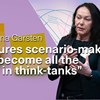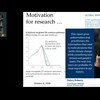anticipatory
Jonathan Boston: Assessing and Applying the Concept of Anticipatory Governance
Jonathan Boston, Professor of Public Policy, School of Government, Victoria University of Wellington.ABSTRACTFundamental to good governance is the active anticipation, assessment and management of risBased on this analysis, the paper applies the concept to the policy challenges posed by climate change adaptation, particularly sea-level rise. In this regard, humanity is confronted with a slow-motion disaster that will grow progressively in scope and scale, sometimes abruptly. Societies will face significant uncertainty, multiple and compounding risks, immense costs and difficult intertemporal and intragenerational trade-offs. More specifically, rising sea levels will have a major and increasing impact on the built environment in coastal regions. Globally, hundreds of millions of people could be forced this century to relocate from areas at risk from coastal erosion and inundation, higher water tables, and more frequent and intense rainfall events. Mitigating some of the risks and increasing societal resilience via anticipatory, pro-active, prudent and adaptive policy responses will be politically challenging, not least because of the large upfront costs, the likelihood of powerful blocking coalitions, and the complexities of inter-governmental and inter-agency coordination. This paper outlines how, in the interests of sound anticipatory governance, these challenges might be addressed through the creation of new governmental institutions, funding mechanisms and revised planning processes.
Christina Garsten: Futures by Proxy: Anticipatory Governance amongst Policy Professionals
Venue: Institute for Futures Studies, Holländargatan 13 in Stockholm or online Research seminar with Christina Garsten, Principal of SCAS and Professor of Social Anthropology at Stockholm and Uppsala Un

Christina Garsten: Futures by proxy - Anticipatory Governance Amongst Policy Professionals
In this seminar, the various ways in which policy professionals in think tanks, and in similar kinds of organizations, engage in future foresight as a means of imagining and governing futures will be
Out of the Golden Cage: PR and the career opportunities of policy professionals
“Out of the Golden Cage: PR and the career opportunities of policy professionals”, Politics & Policy Vol 44 (1), 2016, pp 56-73. This paper focuses on a specific category of political actors – “pol

Julia Steinberger: Is it possible to live well within planetary limits? Evidence and modelling from the LiLi project
Professor Julia Steinberger researches and teaches in the interdisciplinary areas of Ecological Economics and Industrial Ecology. Her research examines the connections between resource use (energy and
Contribute to the global research initiativ IPSP!
The first draft of the report of the International Panel of Social Progress (IPSP), "Rethinking Society for the 21st Century", is out now! We welcome you to comment on the online platform https://comme
Political Integration through Associational Affiliation? Immigrants and Native Swedes in Greater Stockholm
2011. 37:99–115. Journal of Ethnic and Migration Studies. Abstract Theories of participation have been developed and tested almost exclusively on majority populations. While the relative underrepresentat
Julia Steinberger: Is it possible to live well within planetary limits? Evidence and modelling from the LiLi project
Professor Julia Steinbergerresearches and teaches in the interdisciplinary areas of Ecological Economics and Industrial Ecology. Her research examines the connections between resource use (energy and

Transformative partnerships 2030
As part of the 2030 Agenda, all UN member states agreed that sustainable development should be achieved through multi-stakeholder partnerships. But do they?
What Future for Social Investment?
Institute for Futures Studies Research Report 2009/2, 101p. This report assesses the diversity feasibility, but also the relevance of the social investment strategy in Europe. What policies have been i








